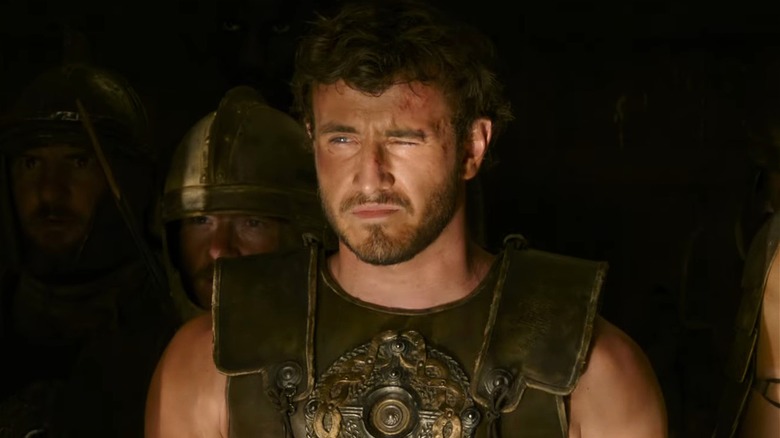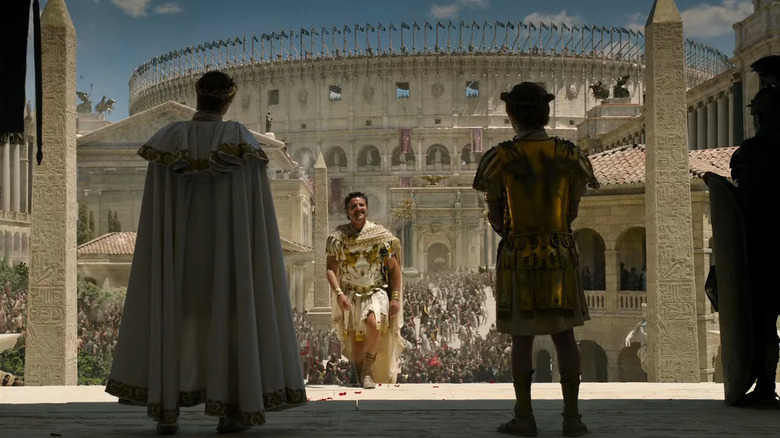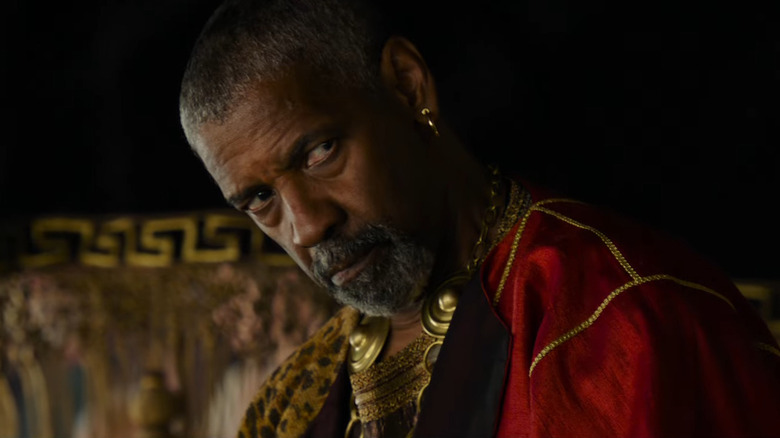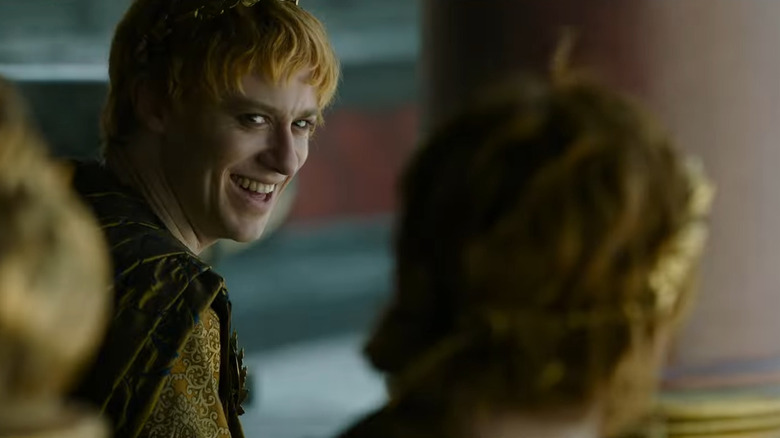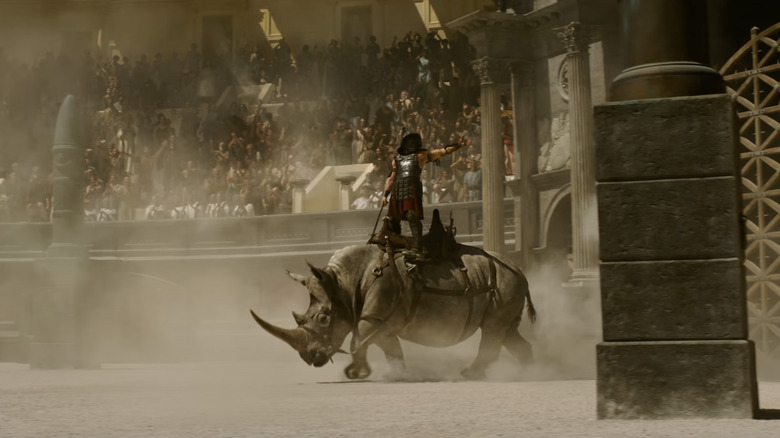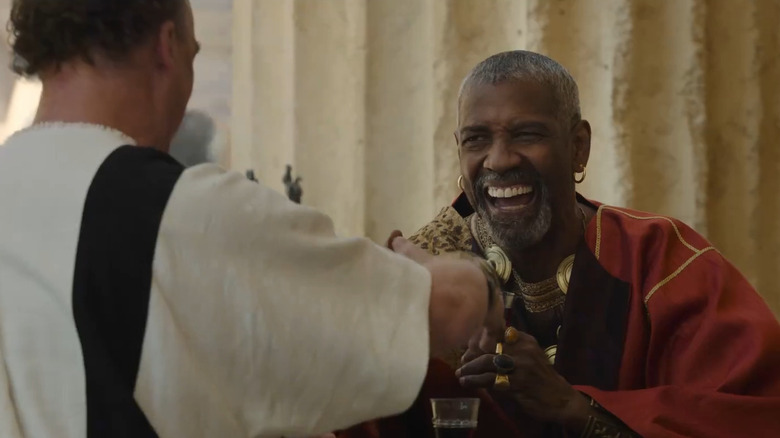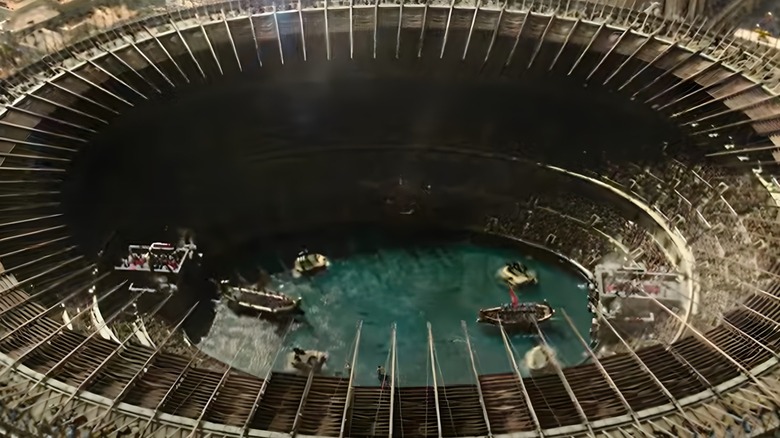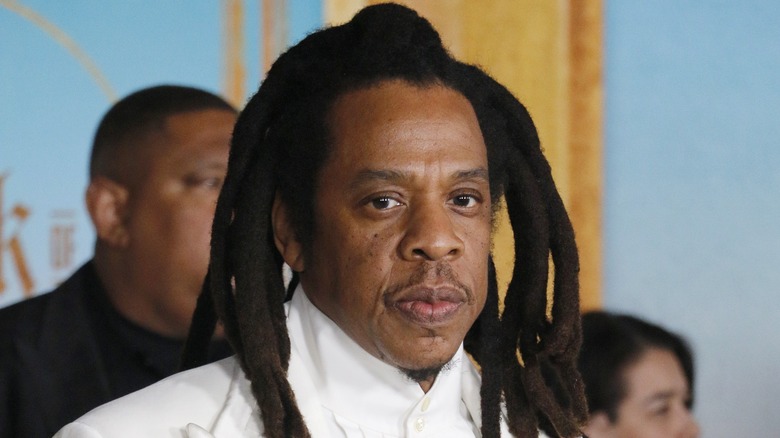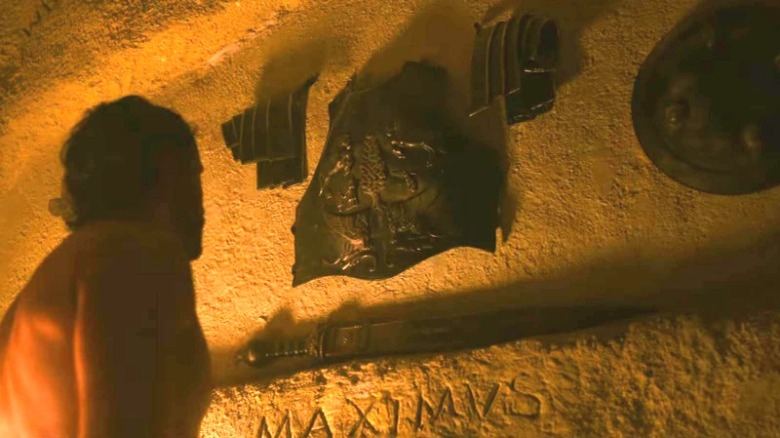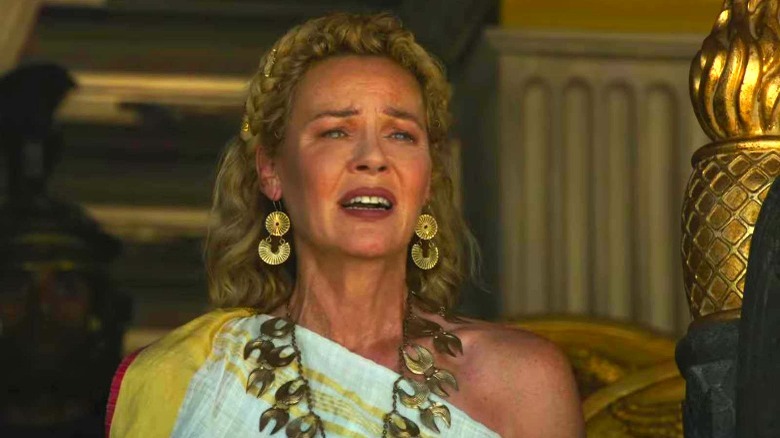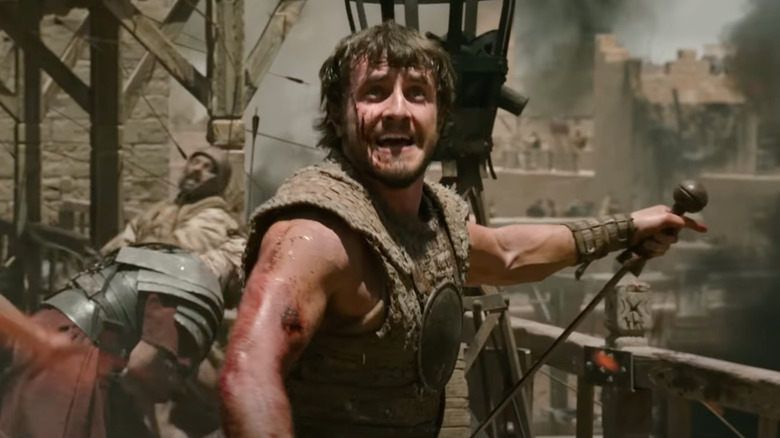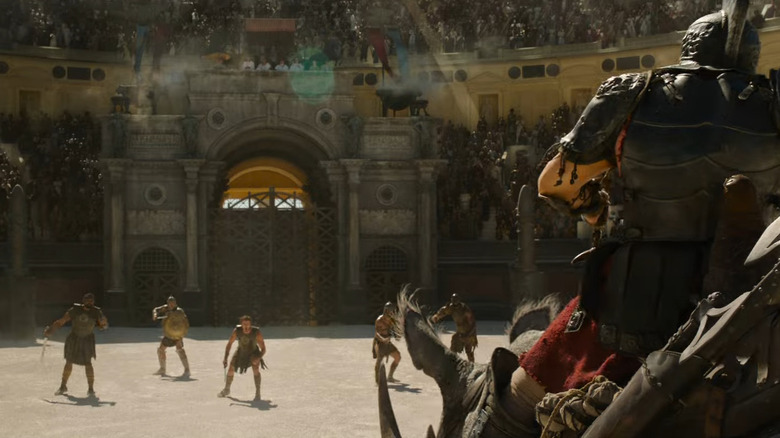Gladiator 2 Trailer: Small Details, Breakdown, And Big Reveals
If you thought you'd just about stopped thinking about the Roman Empire, we've got some very bad news. In what feels like an echo in eternity, the "Gladiator 2" trailer has finally touched down, and legendary director Ridley Scott has thrown everything and the marble kitchen sink into the eagerly anticipated sequel. Sharks and rhinos and battleships, oh my. The return to ancient Rome and the bloody affairs of the Colosseum look to be raging on, with a new hero leading the charge.
This time around, the new gladiator in question is Paul Mescal as Lucius, the son of Lucilla (Connie Nielsen), who somehow finds himself in the games that were previously fought by the legendary slave that defied an emperor, Maximus Decimus Meridius (Russell Crowe). But how has Lucius ended up there? Who is he going to have to face to win his freedom, and which absolute banger is having its needle dropped halfway through this trailer? Well, gather 'round as we show strength, honor and eagle-eyed attention to a preview that boasts backs being stabbed, heads being chopped, and Denzel Washington giving his signature laugh that has us sold completely. To the glory of Rome!
Referencing bread and circuses
About a minute into the trailer, General Acacius (Pedro Pascal) arrives in Rome and is greeted by the emperors Geta and Caracalla (Joseph Quinn and Fred Hechinger, respectively). As they talk, Acacius says, "Rome has so many subjects. She must feed them." The passing reference could be taken two ways.
On the one hand, there are the vast needs of the Roman Empire. By this time in history, it was a sprawling conglomeration of provinces that reached from northern Africa in the south to the Atlantic in the west, the foggy isle of Britannia in the north, and distant Germania and Parthia in the east. Keeping roads and administrations functioning over such a vast distance was a monumental task that occupied much of the Roman emperors' time.
On the other hand, Rome was a city in the middle of the boot of Italy. It was the heart of the empire by the same name, and in the centuries leading up to the setting for "Gladiator 2," higher estimates put the population of the urban center at upwards of a million souls (a staggering number for the ancient world). Feeding this massive city center was a serious undertaking, and grain shipments were perpetually arriving from areas like Egypt and North Africa to keep the city fed.
There's also the "bread and circuses" concept. The Roman poet Juvenal said, "The people that once bestowed commands, consulships, legions, and all else, now concerns itself no more, and longs eagerly for just two things: bread and circuses!" The line references Roman citizens' obsession with getting free bread and having entertainment at all times. The source of much of that entertainment? The Colosseum.
From rags to riches: A Macrinus story
Toward the end of the trailer, Macrinus (Denzel Washington) says, "I was owned. Now, I will control an empire." This is a reference to the wild (though likely exaggerated in the case of Ridley Scott's sequel) story of the Emperor Macrinus.
Washington's character has a fascinating backstory. Macrinus was born in the Roman province of Mauretania (modern day Algeria). His family was of equestrian status, which is a sort of second-class Roman aristocrat. In essence, Macrinus wasn't as important or affluent as the elite Roman senatorial class, but he grew up in a solid upper-middle-class family. He started as a lawyer before working his way all the way up to the lofty position of praetorian prefect, a highly influential individual who functioned as the head of the Emperor's personal bodyguard. Eventually, Macrinus assassinated his own emperor and seized the throne.
Macrinus may not be quite a rags to riches story — even if the movie sounds like it may embellish his origin with the whole "I was owned" bit. Still, he stands out as the first emperor of sub-senatorial status to sit on the throne, which will give his rise to power that much more of an epic trajectory.
A study in bad leadership: Caracalla and Geta
Toward the end of the trailer, General Acacius is shown saying, "I will not waste another generation of young men for their vanity." While the line is left unexplained, this is likely a reference to the young emperors Geta and Caracalla. The brothers are infamous in Roman lore for their mismanagement, selfish behavior, and antipathy toward one another. This is borne out earlier in the trailer when Caracalla, in response to Acacius' concerns about keeping the Romans fed, says, "They can eat war."
The historical fallout between the two brother emperors is an important event in the Empire's fortunes. Encyclopedia Britannica summarizes the familial conflict thusly, "All attempts by their mother to bring about a reconciliation were in vain, and Caracalla finally killed Geta, in the arms of [mother] Julia herself, it is said." The educational site adds the ominous line, "Caracalla's unpredictable behavior is said to have prompted Macrinus, the commander of the imperial guard and his successor on the throne, to plot against him." Looks like we're in for another tumultuous, corrupt Roman emperor plotline, except this time, we won't be dealing with Joaquin Phoenix's Commodus. We'll have double the trouble in the form of the squabbling, bloodthirsty, warmongering siblings Caracalla and Geta.
Those animals battles are historically accurate
The "Gladiator 2" trailer is filled with well-shot moments of spectacle that we've come to expect from Ridley Scott. However, one particular set piece stands out above the rest. In the first look at the epic, viewers see Paul Mescal's Lucius fighting an unexpected foe: a gladiator atop a rhino. At first, it's easy to think that this sequence is just a way to up the ante from the previous film. However, many will be surprised to know that gladiators were actually forced to fight animals.
When it came to fights in the Colosseum, some gladiators had no choice but to test their skills against hungry animals, though not always. In most cases, animals would fight other animals for humans' amusement. The particular matches where humans battled animals were referred to as "venationes," which loosely translates to "wild beast hunts." Some common animals in the Colosseum included bears, rhinos, elephants, and surprisingly, giraffes.
It also appears that there's a staged sea battle in the long-awaited sequel, where a warrior is eaten alive by a shark. Historical accounts suggest that the Colosseum was occasionally flooded and sea creatures were brought in to devour gladiators who couldn't stand up to the test. It's unclear if "Gladiator 2" will feature more animals beefing with humans, but the decision to have Lucius fight a rhino is definitely historically accurate.
Who are you, Macrinus?
Early in the trailer, Macrinus questions Lucius, asking him where he was born and then telling him that he will be his instrument (presumably for gladiatorial vengeance or some such violent political motivation). In response, Lucius says, "who are you?" Considering the fact that Macrinus eventually becomes Emperor of Rome, you might think failing to recognize Macrinus is a bit odd.
However, the obscurity of Washington's character isn't really surprising. His rags to riches story is well-documented, and Ridley Scott and company are clearly playing into that pauper-to-prince narrative. However, putting that line early in the trailer gives Washington's character a shadowy feeling from the jump, even if he ends up bathed in the limelight.
Making the comment even more juicy is the fact that the movie takes place in the lead-up to a historical catastrophe referred to as the Crisis of the 3rd Century. For 50 years (roughly AD 235 – 285) the crumbling Roman Empire goes through a carousel of characters vying for Imperial power. While Macrinus technically pre-dates this by a couple of decades, his rise from obscurity and bid for ultimate power is a nerve-wracking early salvo of the political instability to come.
The ships were also real
"Gladiator 2" looks set to bring more forms of high-octane entertainment to the Colosseum. Early on in the trailer, the amphitheater fills up with water to accommodate ships for some kind of naval battle. This sequence might seem more ridiculous and far-fetched than some of the wacky ideas Nick Cave had in mind for his proposed "Gladiator 2: Christ Killer," but it's actually inspired by real events and illustrates how impressive the Colosseum was in terms of magnitude and scale.
Colosseum ship battles, known as naumachia, were staged spectacles that entertained the Roman masses. These events were mostly choreographed and entailed less bloodletting than some of the other activities that took place at the time in the arena. However, they still delivered visceral thrills and were considerably more ambitious than the typical bloodsports of the time period. It's believed that Emperor Titus organized the first naumachia in the Colosseum, and it required over 3,000 men and several ships to bring it to life. That's quite an impressive feat, and "Gladiator 2" looks like it'll recreate these historic events with aplomb.
That Jay-Z needle drop means a lot more than you think
Jay-Z is nothing short of hip-hop royalty, with countless films and trailers using his tracks to boost moods and atmosphere. In the "Gladiator 2" trailer, viewers hear "No Church in the Wild," his collaboration with Kanye West from his album "Watch the Throne." The trailer particularly highlights and replays two verses from the song, where Jay-Z says, "Tears on the mausoleum floor, Blood stains the Colosseum doors." The lyrics are particularly on the nose, providing emotional context for Lucius' hatred for the empire.
The Grammy-winning song, which features supporting vocals from Frank Ocean and The-Dream, discusses themes such as taking back power against corruption, how leaders are mourned, religious disobedience, and more — making it the perfect track to introduce "Gladiator 2." While the decision to use a rap track for a historical epic has resulted in considerable criticism, the marketing team's creative choice is almost a full-circle moment for Jay-Z. The artist has always referenced the Roman Empire and has a particular fondness for Ridley Scott's OG "Gladiator." He sampled a snippet of Maximus' "Are you not entertained?" line for his 2003 track "What More Can I Say?"
Interestingly, Denzel Washington wanted Jay-Z to write the score for "American Gangster" — his previous collaboration with Scott. The rapper didn't accept, but he was so moved by the 2007 crime epic that he made a concept album based on the pic, also titled "American Gangster." Scott clearly has a fan in Jay-Z, which makes the use of "No Church in the Wild" all the more fascinating.
Lucius finds a familiar suit of armor
While it's clear that "Gladiator 2" has its own battles to fight, the shadow of Russell Crowe's Maximus still hangs over the characters and the Colosseum they're battling in. Lucius tells Macrinus, "I remember that day. I never forgot it. When a slave could take revenge against an Emperor." They're words that almost echo the same ones said by his mother, Lucilla, in the original film ("Today I saw a slave become more powerful than the Emperor of Rome"), giving a strong indication that history is repeating itself. If that really is the case, it would make sense that Lucius eventually rides out in the armor of the original hero that he's inspired by.
At one point in the trailer, Lucius is given Maximus' ring before it cuts to the young hero in what might be the belly of the Colosseum. Looking up at the armor worn by Maximus, along with his sword, we're given what is most definitely Lucius' "suit up" moment, potentially before his final battle against Pedro Pascal's Marcus Acacius. It'll certainly make for an historically hype moment, but one thing that needs addressing is the person that gives him all the gear in the first place.
Does Lucilla recognize her son?
It's confirmed that Paul Mescal's sandal-wearing, sword-swinging hero is Lucius, the son of Lucilla, who returns in "Gladiator 2" seemingly no better off than where she was 24 years ago. How did her darling son grow up to become the war-torn hero he is now, fighting to the death in a stadium she tried to get rid of? More importantly, will this new chapter really dare to use the same trick twice and have a royal in the stands shocked to see someone thought to be dead actually alive and chopping people's heads off to survive? Well, it certainly looks like it.
The difference between this scenario and the one from the original film, however, is that this discovery could stay secret between family, unlike the original movie. You'll recall that after Maximus' still iconic reveal of being a father to a murdered son and a husband to a murdered wife, both Commodus (Joaquin Phoenix) and Lucilla knew who had returned for vengeance. Could "Gladiator 2" see Lucilla play dumb about who this up-and-coming champion really is to keep Pascal's Marcus Acacius in the dark? If so, then to those who are about to lie, we salute you.
Is that war and destruction in Parthia we spy?
A third of the way into the trailer, Emperor Caracalla says to let the Roman people eat war. This is followed by a multi-shot battle sequence showing Roman warships attacking a walled city by sea. It's likely this set piece takes place in Numidia, the African region where Lucius grows up — far away from his mother. Speaking with Vanity Fair, Ridley Scott said that "Gladiator 2" opens "with the raiding party of the Roman fleet, which comes in from the sea and decimates Numidia." With that in mind, it's very possible the trailer is giving audiences a taste of that destruction.
As "Gladiator 2" focuses on the exploits of Emperors Geta and Caracalla, the film may also depict the Parthians, who were among the few capable of standing up against the Roman military. Parthia existed for centuries before its fall a few years after "Gladiator 2" is set. During this time period, Caracalla went to war with the region. There are also visual cues in the trailer; an archer's helmet is similar in design to the Parthian military inscribed on ancient Roman monuments. As with "Gladiator," it looks like we'll have some knock-down, drag-out fights outside of the Colosseum — but this time, it won't be in woody Germania.
What's more, Parthia is the setting for Macrinus' eventual coup, so if Roman history is anything to go by, the location will play a key role in "Gladiator 2."
Revisiting a scene from Gladiator
There are many similarities to "Gladiator" already apparent throughout the trailer. The Colosseum scenes are particularly reminiscent of Russell Crowe's glory days as the Spaniard Maximus. One scene midway through the trailer goes even further, giving distinct callback vibes.
When the Rhino lumbers out of the gates into the arena, we get a shot of Lucius (Paul Mescal) shouting to his petrified fellow fighters, "This is about survival. Survive."
From there, we see half a dozen gladiators, including Lucius, facing down the terrifying beast with its blood-stained horn. The hero shouts out tactics, encouraging his impromptu posse to hold together until the animal charges and then split up and head for the walls. While we won't know how the scene ends until "Gladiator 2" is released in November, we do know how a similar event ends in "Gladiator."
In that film, Maximus and a group of rag-tag, under-equipped gladiators are confronted by chariot-riding opponents armed to the hilt. They band together, under Maximus' direction, and ultimately defeat their overpowered enemies. The scene is a classic, and it already feels like director Ridley Scott is trying to channel that same legend-forming mojo in the rhino scene of the sequel.
